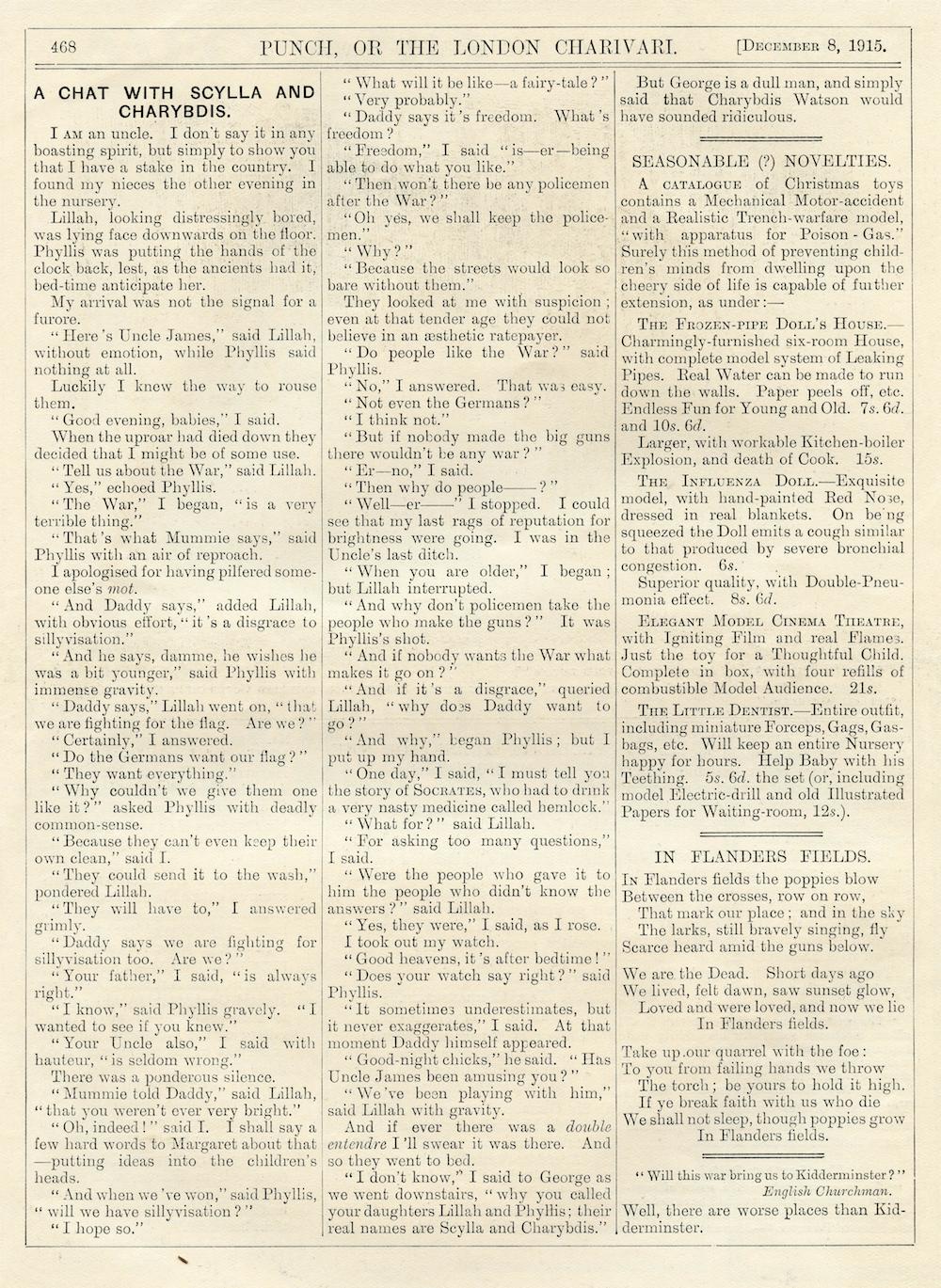(Si Quelqu'un veut m'aider à traduire tout en francais, ca me ferait vraiment plaisire :)
English:
When the United Kingdom declared war on Germany at the start of World War I, Canada, as a Dominion within the British Empire, declared war as well. McCrae was appointed as a field surgeon in the Canadian artillery and was in charge of a field hospital during the Second Battle of Ypres in 1915. McCrae's friend and former student, Lt. Alexis Helmer, was killed in the battle, and his burial inspired the poem, In Flanders Fields, which was written on May 3, 1915 and first published in the magazine Punch. (Helmer's grave was lost, his name appears on the Menin Gate Memorial)  (bottom right)
(bottom right) 
From June 1, 1915 McCrae was ordered away from the artillery to set up No. 3 Canadian General Hospital at Dannes-Camiers near Boulogne-sur-Mer, northern France. C.L.C. Allinson reported that McCrae "most unmilitarily told [me] what he thought of being transferred to the medicals and being pulled away from his beloved guns. His last words to me were: 'Allinson, all the goddam doctors in the world will not win this bloody war: what we need is more and more fighting men.'"
Flanders Fields appeared anonymously in Punch on December 8, 1915, but in the index to that year McCrae was named as the author. The verses swiftly became one of the most popular poems of the war, used in countless fund-raising campaigns and frequently translated (a Latin version begins In agro belgico...). In February 1916 McCrae became "a household name, albeit a frequently misspelt one", regarded his sudden fame with some amusement, wishing that "they would get to printing 'In F.F.' correctly: it never is nowadays"; but (writes his biographer) "he was satisfied if the poem enabled men to see where their duty lay."
On January 28, 1918, while still commanding No 3 Canadian General Hospital (McGill) at Boulogne, McCrae died of pneumonia with "extensive pneumococcus meningitis". He was buried the following day in the Commonwealth War Graves Commission section of Wimereux Cemetery, just a couple of kilometres up the coast from Boulogne, with full military honours. 
There are two main reasons I placed my first (and currently my only) cache here. Firstly; this is an overlooked spot with a great history, before 1995 the bunkers were pretty much delapitated and neglected and my awesome cousins were partly responsible for getting it cleaned up. Secondly; I grew up in Ieper/Ypres until I moved to Canada in 2005 and one of the first things I noticed was that the 'In Flanders Fields' Poem was printed on the ten dollar bill. Until then I didn't even know John McCrae was Canadian. As my first cache, it was the perfect spot to connect my Belgian roots with my Canadian future. My parents -bbacker- currently maintain the cache.
Nederlands:
Aan het begin van de Eerste Wereldoorlog, wanneer Groot Brittannie de oorlog aan Duitsland verklaarde, verklaarde Canada, als deel van het Britse rijk, ook de oorlog. McCrae werd aangewezen als veldchirurg in de Canadese artillerie en was verantwoordelijk voor het veldhospitaal tijdens de tweede slag bij Ieper in 1915. Lt. Alexis Helmer, een goede vriend en ex-student van McCrae werd er toen neergeschoten. Zijn begrafenis werd de inspiratie voor het gedicht "In Flanders Fields", geschreven op 3 mei, 1915 en voor het eerst gepubliceerd in het magazine "Punch". (Helmer's graf, zoals zoveel anderen, is verloren. Zijn naam staat op de Menenpoort)
Op 1 juni 1915 werd McCrae overgeplaatst van de artillerie om de No. 3 Canadian General Hospital in Dannes-Camiers in Noord-Frankrijk op te zetten. C.L.C. Allinson meldde dat McCrae hem "heel onmilitair vertelde wat hij dacht van de overdracht naar het hospitaal en weggenomen van zijn geliefde geweren. Zijn laatste woorden waren: 'Allinson, alle verdomde dokters in de wereld zullen deze oorlog niet winnen; wat we nodig hebben os meer en meer soldaten.'"
Flanders Fields verscheen anoniem in Punch op 8 december 1915, McCrae werd als auteur genoemd in de index later in het jaar. De verzen werden snel een van de populairste gedichten van de oorlog dat in tal van fondsverwervende campagnes werd gebruikt en frequent werd vertaald (de Latijnse versie begint met In agro Belgico...). In februari 1916 werd McCrae "een begrip, alhoewel vaak verkeerd gespeld." Hij beschouwde zijn plotse faam met een lach en hoop dat ze "F.F. nu correct afdrukken anders dan tegenwoordig" maar (schrijft zijn biograaf) 'was hij tevreden als het gedicht de mannen toonde waar hun plicht lag.'
Op 28 januari 1918 stierf McCrae aan een longontsteking met uitgebreide hersenvliesontsteking in het No 3. Canadian General Hospital in Boulogne. Hij werd de volgende dag begraven met volledige militaire eer in de War Graves Commission sectie van Wimereux Cemetery op een paar kilometer van de kust in Boulogne.